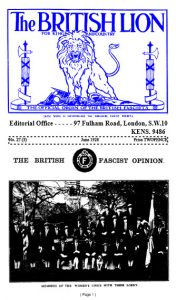FASCISM AND FREEDOM
Being an Account of the Origin, Principles, and Policy of the British Fascists
By “Phoenix”
If England was what England seems,
An’ not the England of our dreams ;
But only putty, brass, and paint,
‘Ow quick we’d chuck ‘er—but she ain’t
Kipling.
1. How the Need for Fascism Arose in England.
IN 1914, we were given definite proof of the triumph of the ideals of duty and sacrifice, and a terrific demonstration of the power and apparently endless vitality that can be contained in a united nation. The cost of this effort, however, was not to be measured in the lives of the fallen; nor the wounds of the maimed; nor yet was it to be reckoned in the crushing war debt and enormous task of regeneration which faced the English people. Rather was it to be found in the sum of all these, plus the most potent factor, the reaction and loss of national vitality which followed the expenditure of so much energy.
The natural consequence of tremendous exertion in the individual is complete collapse, and this was the condition of England after the Great War. Fundamentally, she was unaltered. Her power was unshaken, her territories remained secure, while her vast commercial and industrial organisation was ready to be transferred from the functions of War to those of Peace.
But the soul of England had received a mighty buffeting, and was in need of quick and sympathetic treatment. This was no time for quack remedies, and sententious words of little meaning—the physician in this case must be one to tell the truth, and apply the remedy, however unpleasant both might be. In spite of the obvious need for drastic and scientific action, however, the quacks were called in and each prescribed his own particular material remedy for this spiritual illness, each wondered for how long he might draw his fees, and how much these might be ; while each one avoided the truth for the whole period of his office. The natural consequence was that discontent, suspicion, disloyalty, and indifference to the national interests became increasingly apparent; while the ideals of Duty, Service, Honour and Sacrifice,—those qualities that are so impalpable yet so essential to the welfare of a nation—were gradually transferred to the limbo of forgotten things, only to be spoken of in whispers.
